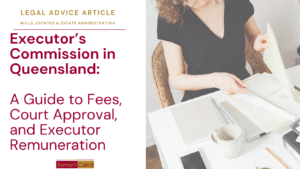
New Year, New Peace of Mind: Your Free Essential Legal Health Check for 2026
The new year is more than just a date on the calendar, it’s a global tradition of renewal, setting goals, and getting your life in
Have you been excluded from a will or believe you’ve been treated unfairly in an estate distribution? At Bennett Carroll Solicitors, we are experts in wills and estate disputes across Queensland. Whether you need to contest a will, challenge an executor’s conduct, or seek a fair share of an estate, our experienced legal team can guide you every step of the way.
We offer remote legal support via phone, email, and video – no office visit needed. Prefer face-to-face? We also have offices in Brisbane, Gold Coast, Sunshine Coast, and Ipswich, and we can come to you if required.
There are three main ways to dispute a will:
If a will doesn’t meet legal requirements (e.g., valid signatures or proper witnessing), it may be challenged.
Common execution issues:
If the testator lacked mental capacity or was pressured/manipulated, the will can be invalidated.
Testamentary capacity requires:
Undue influence includes:
👉 Read: Proving Testamentary Capacity in Queensland Wills
If you’ve been left out or inadequately provided for, you may be eligible to apply for further provision under the Succession Act 1981 (Qld).
Eligible applicants include:
👉 See: Contesting a Will in Queensland – Who Can Apply and How

Start with a confidential chat about your options.
📞 Call 1300 334 566
📧 Email us
💬 Live Chat (bottom right corner)
Or complete our quick Enquiry Form.
Executors have a legal duty to act in the best interests of the estate and beneficiaries.
Common Executor Problems:
Your Rights as a Beneficiary:
[Read: What Can Beneficiaries Do When Executors Delay? → click here]
Generally, executors can:
Beneficiaries may challenge if:
[Read: Can an Executor Sell Real Estate Without Consent? → click here]
Who Can Apply?
What the Court Considers:
Step 1: Initial Assessment – Review the will, assess your case, and discuss outcomes and costs.
Step 2: Evidence Gathering – Collect documents, expert opinions, and witness statements.
Step 3: Negotiation – Attempt settlement or mediation to avoid court.
Step 4: Court Proceedings – File applications, present your case, and obtain court orders if necessary.
✔ Queensland-wide support – All matters can be handled via phone, email, or video
✔ Local offices – Brisbane, Sunshine Coast, Gold Coast & Ipswich
✔ We can come to you if you’re unable to travel
✔ Straight-talking, practical legal advice
✔ Dedicated estate lawyers who understand legal and emotional challenges
✔ Experienced in complex disputes – Contested estates across Queensland
Success rates vary depending on grounds and evidence. We provide realistic assessments.
Each Australian jurisdiction has specific grounds for contesting wills. To establish a solid basis for contesting, and in turn be deemed to be an ‘eligible person,’ the claimant generally must demonstrate that the deceased was subjected to undue influence, threats, constraints, or coercion when creating their will.
Reasons for contesting a will include:
Main risks include legal costs and potential “no costs” orders. We explain all risks upfront.
Depends on circumstances, strength of case, and potential outcomes. We provide honest advice.
If you have been left out of a will, you may be confused about your exclusion from the deceased person’s estate. A will maker, also known as a testator, is entitled to be capricious and improvident when making a will and one of the traditional foundations of succession law is the importance of testamentary freedom. However, the unfettered discretion of a testator has been limited by the development of testator’s family maintenance and family provision legislation, which acknowledges a moral, as well as a legal, imperative on the testator to provide for spouses, children or dependants. If you are a spouse, child, or dependent of the deceased, you may have legal grounds to contest the will. In Australia, you may be able to challenge the will under family provision laws, which are designed to ensure that eligible family members receive adequate provision from the estate. To contest a will, you typically need to demonstrate that you have not been adequately provided for in the will and that you have a legitimate claim to a share of the estate. It is essential to seek legal advice promptly to understand your rights and options, as there are specific time limits for challenging a will.
In Queensland, Australia, it is generally possible to leave a child out of your Will, but it is essential to approach this matter with caution and consider potential legal implications. The Succession Act 1981 governs wills in Queensland, and it grants a person the freedom to dispose of their assets as they wish.
However, if a child believes they have been unfairly excluded from their parent’s Will or have not been adequately provided for, they may challenge the Will’s validity or seek a Family Provision Order to claim a share of the deceased’s estate. To minimize the risk of such challenges, it is advisable to seek professional legal advice when drafting a Will.
To ensure your Will reflects your wishes and is less susceptible to disputes, transparency and clarity in your intentions are crucial. Open communication with all potential beneficiaries, including the child you wish to exclude, may help mitigate potential conflicts and reduce the likelihood of legal challenges after your passing.
The assets go to the next-of-kin according to schedule set out in the Succession Act 1981. Court must appoint an executor which may be a family member or the Public Trustee.
An Executor is the person appointed in your Will to manage and administer your estate after you pass away. In simple terms, the executor is responsible for making sure your property, money, and possessions are distributed according to your wishes.
Their duties may include:
Applying for a Grant of Probate (if required)
Collecting and valuing your assets
Paying outstanding debts, tax, or liabilities
Distributing the estate to your beneficiaries
Executors are entitled to have their reasonable expenses (such as court filing fees or professional costs) reimbursed from the estate.
In Queensland, if the Will does not provide for executor payment, they may also be able to apply to the court for executor’s commission — a percentage of the estate — in recognition of the time and effort involved. This is more common when the administration is complex, lengthy, or requires significant work.
Some Wills include a specific gift or payment for the executor as compensation. In many families, however, executors are often close relatives who take on the role without payment.
Beneficiaries are the people or organisations named in a Will who are entitled to receive part of the deceased person’s estate. This may include family members, friends, charities, or others chosen by the Will-maker. Beneficiaries can receive specific gifts (such as money, property, or personal items) or a share of the overall estate.
By ensuring that your Will is valid, current and has been drawn up by a professional, such as Bennett Carroll Solicitors. We will advise you on the most effective means of distributing your assets and ways in which assets can be protected.
Yes. In Queensland, you must notify the executor of your intention to contest within 6 months of death, and file your claim within 9 months. Missing these deadlines can mean losing your right to claim.
Don’t let unfair treatment in an estate go unchallenged. Our experienced estate dispute lawyers are here to protect your rights.
Most estate disputes are resolved without stepping foot in court and without needing to visit our office.
Whether planning, administering, or resolving disputes, our team can assist. Explore our Planning, Administration, and Disputes resources


The new year is more than just a date on the calendar, it’s a global tradition of renewal, setting goals, and getting your life in

When someone passes away in Queensland, the executor of their will is responsible for managing the estate, a role that can involve significant time, responsibility,

When someone passes away or when you’re planning ahead one of the biggest challenges is knowing exactly who needs to be notified. Missing a key